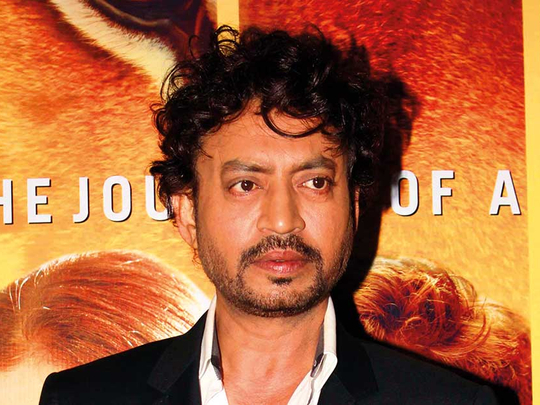
Bollywood actor Irrfan Khan, who was recently diagnosed with near-fatal neuroendocrine cancer, shared his trials and turmoil on Tuesday in a heartwarming note.
Titled A Note From London to English daily Times of India, Khan, who is currently receiving treatment in London, spoke at length about how he was a part of a “trial-and-error game” since his cancer was rare and how he had gone through phases of shock, anger and resignation in the last few months. His note also chronicled his deepest fears.
Skip to: What is a neuroendocrine cancer?
“I had been in a different game, I was travelling on a speedy train ride, had dreams, plans, aspirations, goals, was fully engaged in them. And suddenly someone taps on my shoulder and I turn to see. It’s the TC [ticket collector]: ‘Your destination is about to come. Please get down.’ I am confused: ‘No, no. My destination hasn’t come.’ ‘No, this is it. This is how it is sometimes,’” Khan wrote.
“The suddenness made me realise how you are just a cork floating in the ocean with unpredictable currents! And you are desperately trying to control it,” he added.
Khan, who will soon feature in films including Karwaan and Puzzle, also spoke about how the disease had triggered feelings of fear and panic. Initially, he was inconsolable and had no motivation. But his turning point came in the form of a poster of a smiling cricketer Vivian Richards and his view from his balcony in the hospital.
“As I was entering the hospital, drained, exhausted, listless, I hardly realised my hospital was on the opposite side of Lord’s, the stadium … Once, while standing on the balcony of my hospital room, the peculiarity jolted me. Between the game of life and the game of death, there is just a road. On one side, a hospital, on the other, a stadium. As if one isn’t part of anything which might claim certainty – neither the hospital, nor the stadium. That hit me hard,” Khan said.
Khan, who is one of Bollywood most critically-acclaimed actors, was convinced that the hospital’s location was a sign from the universe.
“The peculiarity of my hospital’s location — it hit me. The only thing certain was the uncertainty. All I could do was to realise my strength and play my game better. This realisation made me submit, surrender and trust, irrespective of the outcome, irrespective of where this takes me, eight months from now, or four months from now, or two years. The concerns took a back seat and started to fade and kind of went out of my mindspace.”
Khan, in his note, also spoke about how his disease had made him realise the essence of what freedom is.
“For the first time, I felt what ‘freedom’ truly means. It felt like an accomplishment. As if I was tasting life for the first time, the magical side of it. My confidence in the intelligence of the cosmos became absolute. I feel as if it has entered every cell of mine.”
The actor also thanked his fans for their prayers and how he felt their infinite goodwill in every cell of his body.
“Each flower, each twig, each leaf which has come from the cumulative prayers, each fills me with wonder, happiness and curiosity. A realisation that the cork doesn’t need to control the current. That you are being gently rocked in the cradle of nature,” he said.
In March, Khan had revealed on his social media account that he was diagnosed with a rare form of cancer and he had expressed the need for privacy. He also promised to keep his fans updated about his condition, and he clearly has kept his end of the promise.
Everything you need to know about Khan's cancer
Bollywood actor Irrfan Khan, who was recently diagnosed with neuroendocrine cancer, has written about his fears and his struggles so far with the condition. A rare form of cancer, neuroendocrine disorders can be fatal in some cases. Steve Jobs is another well-known figure who was diagnosed with a neuroendocrine cancer, in his pancreas.
What is it?
The NCI (National Cancer Institute of the United States) Dictionary of Cancer Terms defines a neuroendocrine tumour as one that forms from cells that release hormones into the blood in response to a signal from the nervous system. Most commonly occurring in the liver, the tumour may also be in the pancreas, lungs, skin or other organs of the body.
Is it fatal?
It is a near-fatal form of cancer, but this depends on various factors including early diagnosis, organs affected, stage of cancer, treatment trials and others. According to a 2015 research report, such cancers have an average survival rate of 5 years, which would mean that most patients survive for at least five years after diagnosis - but this again would depend on a multitude of factors.
Treatment options
Neuroendocrine cancers are usually slow-growing, and therefore, removal of the tumour is the preferred option. This method, after the tumour being diagnosed in early stages, is a good prognosis for most forms of the cancer.
Like other cancers, radiation, chemotherapy and targeted therapy are also common ways to manage the tumour - in case removal is not advised or if the cancer has spread to other organs (metastasis).












